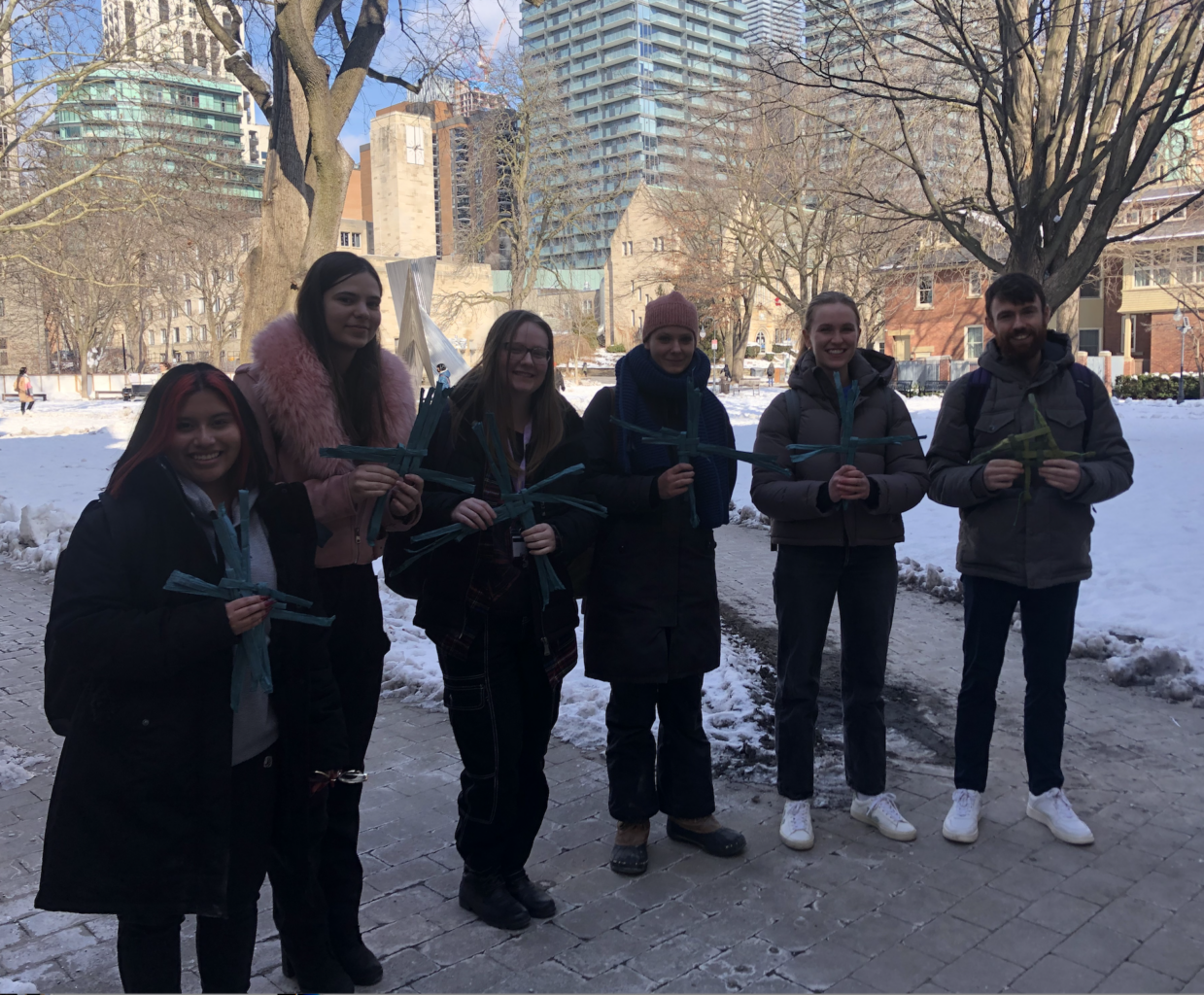This March, the University of St. Michael’s College is celebrating its Celtic roots by showcasing many aspects of this rich and vibrant culture. The Basilian Fathers founded St. Michael’s College in 1852 to give the poor Irish immigrants, who comprised a significant portion of Toronto’s Catholic population at the time, access to higher education. Since 1979, St. Mike’s students could study the heritage of its pioneering students with the establishment of the Celtic Studies program. The program continues to earn international attention for its groundbreaking work, particularly in Irish scholarship.
The Celtic Studies program is bolstered through the support of its partner, The Ireland Funds of Canada, which is hosting its popular St. Patrick Day Luncheon. This year’s event will take place on March 7 at the Fairmont Royal York and will draw a large crowd. Among those in attendance will be Janice McGann, the Consul General of Ireland, Toronto. Proceeds from the luncheon will support the Ireland Funds of Canada endowment in the Celtic Studies program.
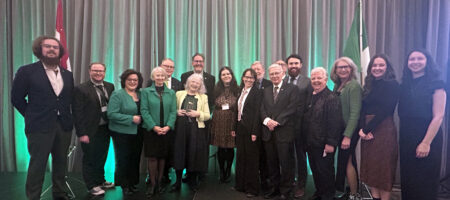
“Celtic Studies offers students an unparalleled opportunity to research and explore Ireland’s cultural legacy and its profound global influence, all of which is made possible through our partnership with the Ireland Funds of Canada. The funds raised at this year’s event will help support ambitious plans for Celtic Studies at St. Mike’s,” says Lisa Gleva, St. Mike’s Executive Director of Advancement.
This year marks the 200th anniversary of the birth of Thomas D’Arcy McGee, an Irish-Canadian politician, Catholic spokesman, journalist, poet, and a Father of Canada’s Confederation. In acknowledgment of his legacy and the important historic and continuing contributions of the Irish in Canada, the University of St. Michael’s College has partnered with the Embassy of Ireland and Consulate General of Ireland, Toronto, to establish the St. Michael’s College Awards for Irish Heritage. Elementary and secondary school students are invited to submit projects that explore and celebrate Irish heritage in our city, province and country. The submission deadline is March 26.
Celtic spirit flourishes both inside and outside of the classroom as Celtic Studies boasts a very active and proud Course Union that hosts numerous co-curricular events centred around Celtic language, sport, food, and culture.
“We are a close-knit group—both the faculty and the students. It’s one of the advantages of being a part of a small program as you get to know your classmates and professors on a different level. We all have a fierce pride for Celtic studies and the language programs, and we promote them whenever possible to ensure people know about the crosscutting nature of the courses,” says Cameron Foley, Event Coordinator for the Celtic Studies Course Union. “We embody the Celtic craic (fun) and love the ancient cultures.”
March gives us the occasion to celebrate not only Ireland’s patron saint, but also the patron saint of Wales, St. David. On March 7, the Celtic Studies Course Union has organized festivities celebrating Welsh culture as part of St. Michael’s Culture Week. The festivities will include a supper in Macrina Hall of St. Basil’s Church with a menu featuring traditional potato and leek soup with homemade bread.

This semester, Celtic Studies Prof. Pa Sheehan began hosting pop-up gaeltacht events on a bi-weekly basis. The purpose of a gaeltacht is to allow the Irish language to become the default language at a set place and time.
“To be a speaker of Irish in Canada means making a deliberate effort to use the language as frequently as possible, which can admittedly be a challenging process at times. A pop-up gaeltacht makes this process much easier. These events normalize the use of Irish at a particular time and place. An open and welcoming space for anyone willing to use the Irish language,” says Sheehan.
Upcoming gaeltachts are scheduled for Friday, March 7 and 21 at 7 p.m. at PJ O’Brien’s Irish Pub and Restaurant.
On Friday, March 14 all are welcome to join in the céilí held in Charbonnel Lounge on at 6:30 p.m. March’s celebrations will be rounded out an Irish language movie screening hosted by the Toronto branch of Conradh na Gaeilge, a social and cultural organization that promotes the Irish language in Ireland and worldwide. A showing of Kneecap is scheduled for Friday, March 21 at 7 p.m. in AH100.
For incoming students wishing to do a deeper dive into Irish Gaelic culture, St. Michael’s will be offering a new experiential learning course for the 2025 Fall term. Students enrolled in this course will have the opportunity to travel to Ireland and be immersed in the rich culture that studying Irish language, traditional Irish singing and dancing, sport, media, drama, and contemporary Irish literature (in English and in Irish).
Learn more about our Celtic Studies program.
St. Mike’s congratulates Prof. Mark McGowan, an International Co-Leader (Canada), on “Historic Houses and Global Crossroads: Revisioning Two Northern Ireland Historic Houses and Estates,” which has been awarded a major research grant from the Arts and Humanities Research Council of the United Kingdom for 2025-2027.

The project, which brings together scholars, communities, thinkers and econometricians from all over the world, is led by the Treaties Spaces Research Group based at the University of Birmingham (UK).
Prof. McGowan’s work is focused on Lord Dufferin, Governor General of Canada from 1872-1878, and his engagement with Indigenous issues during his tenure—the creation of the Indian Act, and government sponsorship of Indigenous Residential Schools. Dufferin was the Lord of Clandeboye House, near Bangor, County Down, and the Canadian dimensions of the project highlights the imperial/colonial connections of this estate, through its owner.
McGowan’s grant will take him to Clandeboye, the Public Record Office of Northern Ireland, and the British Library. The project also highlights the research dimension of St. Mike’s Celtic Studies program, and the international presence of the program.
Learn more in this short video clip featuring Professor Joy Porter, the lead investigator.
When St. Mike’s Professor David A. Wilson completed his two-volume biography of the Irish Canadian Father of Confederation Thomas D’Arcy McGee, he was planning to continue teaching in the College’s Celtic Studies Program for the rest of his career. Instead, in 2013 he was appointed General Editor of the Dictionary of Canadian Biography, and has been there ever since – while still retaining a connection with the Program.

“I love working with such a talented team of editors and translators,” he says, “and having the opportunity to bring our biographies to the widest possible audience,” he says. With over 9,000 biographies published and more coming out each week, the Dictionary is the largest bilingual project in Canadian humanities. “Drawing mainly on primary sources, our biographies range from prime ministers to public hangmen, cardinals to cult leaders, bureaucrats to bootleggers,” Wilson notes. “From the story of a young Indigenous boy who froze to death while on the run from a residential school, to that of a mentally ill woman trapped in an Asylum for the Insane, they reflect a wide variety of Canadian experiences.”
Now, thanks to a new website developed by the teams at the University of Toronto and Université Laval in Quebec and launched this July, it will be possible for even more readers and researchers to learn about the women and men who helped make the country what it is today.
“Almost all Google searches are by theme rather than by name,” Wilson explains; “by linking individual biographies to broader themes, the new website will make our biographies much more accessible. At the same time, the links enable our readers to learn more about themes related to a particular biography.” For example, if someone Googles “Enslaved Black people in the Maritimes,” they will be directed to more than 40 related biographies, can read an essay outlining their historical context, and will have access to other sources on the subject.
Individual biographies are starting to get a new look as well. More of them now begin with a 100-word summary of the entry so that readers can quickly assess their significance, and they have headings and subheadings that highlight particular sections.
Until recently, the Dictionary had been organized chronologically by death date, with the new entries focusing entirely on the 1940s. Now, half of the biographies are drawn from all periods, enabling the Dictionary to draw on new research from earlier periods and to move forward into more recent times.
“Everyone in our Toronto and Quebec offices is excited by these changes,” says Wilson. “We have much more flexibility, and can include even more biographies of Indigenous peoples, racialized minorities, women and members of the working classes.”
All the biographies are subjected to a thorough editorial process. As General Editor, Wilson is the final set of eyes, reading each piece before it is posted to the website. “By the time the biographies land on my desk,” he says, “they need very little work. This is probably the most rigorously researched dictionary of national biography in the world.”
Unlike many other biographical dictionaries, the Dictionary of Canadian Biography remains free to readers, thanks to the support of the federal government, as well as of donors. Wilson is currently engaged in a fundraising campaign to ensure the Dictionary can continue its current level of activity and its contributions to the history of Canada.
“It is such an honour to be in both the Celtic Studies Program and the Dictionary of Canadian Biography,” says Wilson, “and to contribute in different ways to the intellectual life of the country.”
You can check out the website at www.biographi.ca
The University of St. Michael’s College is delighted to announce that Dr. Eamonn McKee, Ireland’s Ambassador to Canada, has been named an honorary fellow of the University. Formal acknowledgement of the appointment will be made on Tuesday, May 28 at the opening reception for the Canada, Ireland & Transatlantic Conference, which takes place at St. Michael’s May 28-30.

“It is a privilege to offer recognition of the extraordinary friendship Ambassador McKee has shown St. Michael’s in the four years of his appointment to Canada,” says University President David Sylvester. “The local Irish community played a significant role in the founding of the College in 1852. More than 170 years on, our Celtic Studies program is a testament to those ties. We are grateful to Ambassador McKee for his ongoing support for—and involvement in—this world-renowned program.”
Honorary fellowships are awarded to individuals whose ongoing work aligns with the vision and values of the University. An honorary fellowship draws the recipient into the St. Michael’s community for mutual enrichment, inspiration and encouragement.
“I am thrilled and honoured to become an Honorary Fellow at St Michael’s,” says Ambassador McKee. “There has always been a warm welcome for me at the College. It has had a long and enriching relationship with the Embassy and indeed with all my predecessors as Ambassador.
“The College has been a source of great new friendships for me. I am indebted to Professor Mark McGowan for all his guidance as well as the corpus of his work on the Irish in Canada,” Ambassador McKee says. “He has become a great friend as we collaborate on projects like Fifty Irish Lives in Canada and the Global Irish Famine Way. President David Sylvester along with Principal Irene Morra have a great vision for the College and Irish studies are very much a part of that, I am delighted to say. I think that Irish Studies in Toronto have been served very well by St. Michael’s. There is tremendous scope for expansion and development.”
Born in Dublin, Dr. McKee was appointed in 2020 as Ambassador of Ireland to Canada, Jamaica and The Bahamas, having served previously as ambassador to Israel and South Korea. He holds a degree in modern Irish history and economics from University College Dublin and earned a doctorate from the National University of Ireland, with a thesis on Irish economic policy, 1939 to 1952.
Dr. McKee joined Ireland’s Department of Foreign Affairs in 1986. His storied career has placed him at a key juncture in modern Irish history. While stationed in Washington from 1990 to 1996, he became part of the early discussions on the Northern Irish Peace Process. He then was appointed a member of the Irish government’s team involved in the negotiation of the Good Friday Agreement, which helped bring peace to Northern Ireland.
“The story of the Irish in Canada has been a revelation to me over my four years here. The influence of the Irish has been profound, their experience over the generations reflective of powerful forces at work on both sides of the Atlantic,” he says. “The range and depth of this story is barely known in Canada and virtually forgotten in Ireland. I can guarantee you that my explorations of this won’t finish when I leave in August so I’ll be a Fellow in word and deed!”
The University of St. Michael’s College salutes Professor Emerita Ann Dooley, who has been named the inaugural recipient of the Ireland Funds Canada Distinguished Leadership Award.

Dooley, one of the founders of St. Michael’s Celtic Studies program, has been inspiring students and working as a tireless ambassador since the program’s inception. She was presented the award – a custom book box containing a first-edition, signed copy of works by the renowned Irish poet Seamus Heaney– at the Ireland Funds Canada’s St. Patrick’s Day luncheon, held March 8 at the Arcadian Court in Toronto. Proceeds from the event will benefit the Celtic Studies program.
In 1975, while Dooley was a graduate student at Toronto’s Centre for Medieval Studies, she was approached by Fr. John Kelly, CSB, then St. Michael’s President, and the English Department’s Prof. Robert O’Driscoll to discuss creating an introductory course in Celtic Studies.
An instant success, the class quickly led to more courses being added, with Mairin Nic Dhiarmada teaching Irish Language, and then Prof. David Wilson joining to teach history. Over the years, numerous graduate students and graduates of the program have come back to teach as sessional instructors, and you’ll find others teaching at such schools as Harvard, Trinity College Dublin, and at the National University of Ireland Galway.
The 2024 Distinguished Leadership Award was presented jointly by Oliver Murray, Chair of the Ireland Funds Canada, and long-time St. Michael’s friend Eithne Heffernan, who serves as Vice-Chair.
While the Global Ireland Funds has long honoured exceptional community members, Dooley’s award is the first time that the Ireland Funds Canada has chosen to honour a local recipient, Heffernan noted during the presentation.
Describing Dooley as “a leading light in Celtic and Mediaeval Studies,” Murray said the award was made “with great affection and appreciation for her tireless efforts supporting and promoting Celtic Studies in Toronto and Canada.”
Heffernan agreed, noting that Dooley “has spent a lifetime nurturing and educating students whom she inspired to great academic heights. She instilled in them a love of learning and of all things Irish from language to literature,” adding that she continues to be greatly loved, respected, and admired at the University by students and faculty, and by the Irish Community in Toronto.
Always generous to her colleagues, Dooley attempted to convince her program seatmates to rise with her and approach the stage to accept the award.
“It was so good of them,” Dooley says of the Ireland Funds, but she is quick to add that “the real story is the whole team, whose wonderful work is now the real story of the program, not me,” noting the ‘great contributions of Profs. Mark McGowan, David Wilson, Brent Miles, Pa Sheehan, and those who teach in the program thanks to the Ireland Canada University Foundation (ICUF).
“As many members of the local and international community know, Ann Dooley has been the defining heart and soul of the Celtic Studies program,” says St. Michael’s Principal Irene Morra. “She is, moreover, an extraordinary scholar and linguist. Her work encompasses and speaks to the breadth, rigour, and uniqueness of the program at St Michael’s College: it has ranged from Celtic mythology through to literary, cultural, and linguistic traditions from the medieval period well into the contemporary age. She is, as scholars, colleagues, and former students can attest, an absolute model of academic curiosity, knowledge, and advocacy.”
The Ireland Funds Canada has a long tradition of advancing non-political, non-sectarian, causes throughout Ireland and in Canada. The organization connects people of Irish heritage to bring positive change within Canada and Ireland, shaping culture, reconciliation, and enhancing education.
Read more on the Ireland Funds website.
The C.P. Stacey Award Committee and the Laurier Centre for the Study of Canada (LCSC) have awarded historian David A. Wilson of the University of St. Michael’s College the 2022 C.P. Stacey Award for scholarly work in Canadian military history.
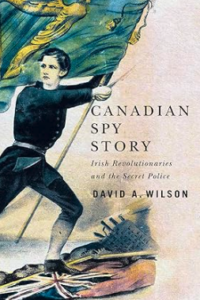
Canadian Spy Story: Irish Revolutionaries and the Secret Police (McGill-Queen’s University Press) examines the 19th-century Irish revolutionary Fenian movement and its efforts to confront British imperialism in Ireland with armed invasion and insurrection in British North America. In the years just before and after Canadian Confederation, the Fenians were seen as a significant security and military threat. In Wilson’s expert hands, the story of clandestine efforts by Canadian secret police and British authorities to infiltrate and assess Fenian networks in the U.S. and British North America make great history and great reading.
“This exceptionally well-researched book has plumbed the depths of Canadian, American and British archives, as well as dozens of 19th-century newspapers and other publications, thoroughly reconstructing how authorities responded to a revolutionary threat that aimed to strike first at Britain’s North American colonies and then a newly independent Canada,” the C.P. Stacey Award Committee noted. “The Fenian invasions of the 1860s and 1870s are widely recognized as a key factor that led to Canadian Confederation in 1867, and now the secretive efforts to gather the intelligence that gave Canadian and British governments the information needed to appreciate the defence threat posed by the Fenians have been definitively addressed.”
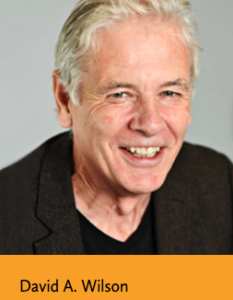
Wilson is a professor in the Celtic Studies program at St. Michael’s College and the Department of History at the University of Toronto, as well as general editor of the Dictionary of Canadian Biography. The recipient of many awards and prizes for research and teaching, Wilson is also known for his two-volume biography of Thomas D’Arcy McGee.
Historian C.P. Stacey was brilliant in his ability to contextualize and frame military history in its contemporary political contexts. The award committee collectively found Wilson’s work mirrored this approach, remarking “Canadian Spy Story is a highly readable example of why military history has meaning and relevance for all Canadians.”
The award committee was struck by the considerable depth of choice when working to choose the winning book. There are two honorable mentions for the 2022 C.P. Stacey Award:
- Terry Copp with Alexander Maavara, produced a richly nuanced view of the First World War as experienced in one of Canada’s most diverse and complex cities in Montreal at War, 1914-1918 (University of Toronto Press). Their findings deepen, and frequently trouble, the understanding of Montreal’s place in Quebec and Canada during the war and beyond.
- Matthew Barrett, in Scandalous Conduct: Canadian Officer Courts Martial, 1915-1945 (UBC Press), provides a detailed study of Canadian officer courts martial and demonstrates how dismissal from the services had an influence on officers’ conduct, while allowing for redemption through service as other ranks.
The C.P. Stacey Award is named in honour of Charles Perry Stacey, historical officer to the Canadian Army during the Second World War and later a longtime professor of history at the University of Toronto. The award is presented annually to the best book in the field of Canadian military history, broadly defined, including the study of war and society. The award winner receives a $1,000 prize, made possible through the generous support of John and Pattie Cleghorn and family and the Department of History at Wilfrid Laurier University. The LCSC took over administration of the award in 2018 from the Canadian Committee for the History of the Second World War.
The 2022 C.P. Stacey Award Committee consisted of Kevin Spooner (Wilfrid Laurier University; director, LCSC), Isabel Campbell (Directorate of History and Heritage, National Defence Headquarters, Ottawa), and Lee Windsor (University of New Brunswick). Learn more at LCSC’s War and Society research cluster.
(Source: Wilfred Laurier University press release)
The University of St. Michael’s College offers congratulations to Dr. Mark McGowan on the release of his latest book, Hunger and Hope:The Famine Migration from Strokestown, Roscommon, in 1847 (Cork University Press & the Great Hunger Institute at Quinnipiac University).
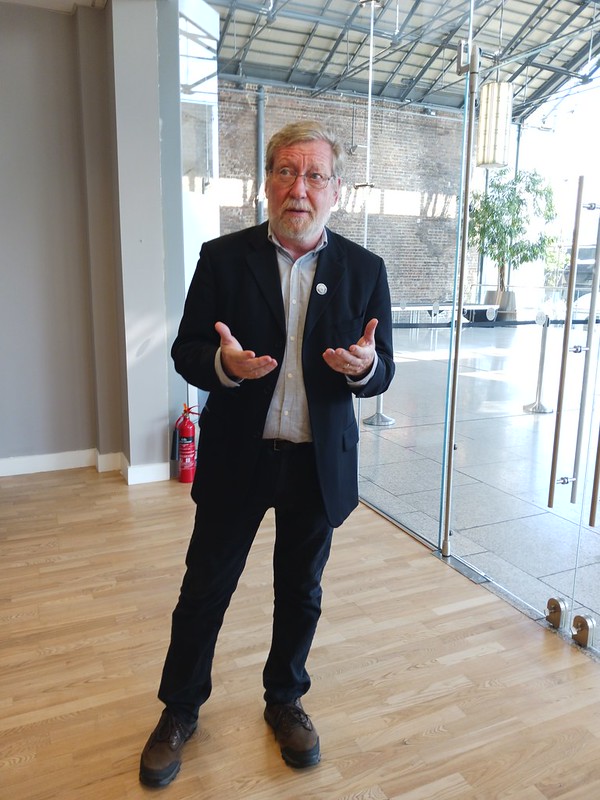
Hunger and Hope is the product of 10 years of research from a joint team of historians based in Ireland, the United States and Canada. As such, says McGowan, it is a work that reflects the benefits of collaboration and the potential inherent in the Memorandum of Understanding St. Michael’s signed with Maynooth University in Ireland earlier this year.
McGowan was the lead researcher and created independent studies courses for two selected teams of senior undergraduate researchers from the University of Toronto–and particularly St. Michael’s College.
These teams explored routinely generated records—e.g., census data, cemetery records, and church registers–to uncover the story of 1,490 assisted migrants from Major Denis Mahon’s estate in Central Ireland. Three in 10 migrants did not survive the voyage or the typhus epidemic that ran rampant in the sheds of Grosse Ile, Canada’s quarantine station near Quebec.
“The book tracks the migrants from the estate through their harrowing experiences in Liverpool and their transatlantic voyage on four ships of questionable quality,” McGowan says. “It then tries to examine what happened to the survivors in Canada and the United States. It is an -eight-chapter narrative that puts names, faces, and individual stories to one of the worst and much misunderstood episodes during the Great Irish Famine.”
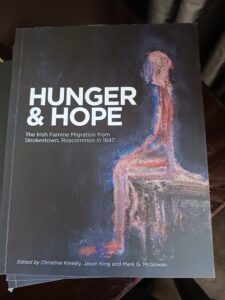
Notes St. Michael’s Principal, Dr. Irene Morra, “This book speaks to the extraordinary historical knowledge and level of vital enquiry that Prof. McGowan continues to manifest in his publications and that he has inspired in his students in History and in the Celtic Studies program at St Michael’s College.”
St. Michael’s Principal from 2002-2011, McGowan is a historian renowned for his work on the Great Irish Famine, as well as the lasting impact the Famine’s mass migration had on Canada.
He has won multiple awards for both his teaching and writing and is also well known for his work in Catholic education, including studying the history of Catholic education in Ontario.
His lengthy list of publications includes The Waning of the Green: Catholics, the Irish and Identity in Toronto, 1887-1922, Death or Canada: The Irish Migration to Toronto, 1847, and The Imperial Irish: Canada’s Irish Catholics Fight the Great War, 1914-1918.
Cross-appointed to the University of Toronto, McGowan served as Deputy Chair of the history department (2017-19), as Senior Advisor to the Dean of Arts & Science, International (2014-17) and as Acting Vice-Provost, Students, for the University of Toronto for part of 2013.
Most recently he served as St. Michael’s Interim Principal, from July 2020-July 2022 and continues to serve the university as as professor emeritus and special advisor to the president.
With St. Patrick’s Day nearing, popular culture is predictably filled with generic images of shamrocks and leprechauns. But when Anthony Trindle (or Antóin Ó Trinlúin, in his native Irish) reflects on the students he’s teaching in St. Mike’s Celtic Studies program, he describes them as having a complex understanding of Ireland and its enduring impact on Canada.

Trindle, who hails from Ballyphehane in Cork City, is this year’s Ireland Canada University Foundation’s (ICUF) Irish Language scholar at the University of St. Michael’s College, where his duties include teaching the only advanced-level course in Irish in Canada. When he’s not lecturing at the university, he also serves as an ICUF cultural ambassador in the broader community.
“Coming from Ireland, where everyone has to study Irish, I am now teaching students who have really gone out of their way to study the language, and who have to work hard to keep (their language skills) up,” he says. “It’s really refreshing. This is a once-in-a-lifetime opportunity to study what you want to study.”
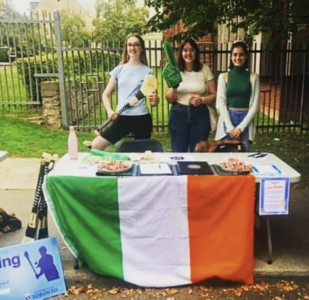
With census figures indicating one in six Canadians identifies as being of Irish descent, it’s not surprising that some students enroll in Irish language courses to do a deeper dive into their ancestry, notes Pa Sheehan, a former ICUF scholar who now is an assistant professor in St. Michael’s Celtic Studies program. Others, he and Trindle suggest, take on the challenge of learning an unfamiliar language because of an appreciation for engaging with the humanities and the resulting benefits of acquiring knowledge, even when those results gained are at a distance from day-to-day life.
But there is also a very practical reason to learn Irish, Trindle notes, and that is because the European Union’s decision to grant full status to Irish as an official language within the EU has created a new demand for Irish speakers across Europe, including in EU offices.
When Trindle is not lecturing, he can be found engaging in a variety of ICUF-related activities, including working to establish a local chapter of Conradh na Gailge, or The Gaelic League, an association of Irish speakers. Earlier this month, he organized a pop-up Gaeltacht, echoing the areas in Ireland where Irish is the primary language spoken, with more than 150 people joining the league in the first three weeks after it was launched.
His ICUF role also includes teaching a variety of levels of Irish-language classes on a more informal basis within the community, with weekly classes offering not only language instruction but also some insights into Irish life and culture.
Both Trindle and Sheehan say their knowledge of Irish has opened many doors for them, including travel, with Sheehan having taught in Newfoundland and Montana before coming to Toronto, and Trindle studying Irish at The Netherlands’ Utrecht University before coming to St. Mike’s.
“My knowledge of the Irish language brought me to Canada,” he says.
When asked how he’s finding Toronto, Trindle says he “loves it here” because both the University of Toronto and the city are very vibrant, with diversity and a lively arts landscape.
The two educators chatted recently about what Trindle has enjoyed about Toronto – and what he’s missed about home — on Sheehan’s Irish in Toronto podcast.
On February 1, Prof. Pa Sheehan and students in his “Introduction to the Irish Language” class made St. Brigid’s Day crosses, to mark the feast day of Ireland’s patroness saint and the traditional Gaelic festival celebrating the beginning of Spring.
Devotees see Brigid, and the ancient Irish goddess whose name and attributes she shares, as emblematic of feminine spirituality and empowerment. Brigid’s Day is particularly significant this year since it is the first national holiday in Ireland to honour a woman.
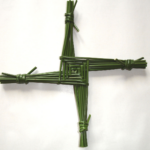
A Brigid’s cross usually consists of rushes woven into a four-armed equilateral cross, but Sheehan’s students made crosses out of paper material as it is difficult to come across rushes at this time of year in Toronto!
The crosses are traditionally hung over doors, windows, and stables to welcome Brigid and for protection against fire, lightning, illness, and evil spirits and are generally left until St Brigid’s Day the following year.
The first day of February also celebrates the traditional Gaelic festival of Imbolc. This festival celebrates the end of winter and the beginning of spring. Consequently, it seems that St. Brigid’s Day has replaced Imbolc and is associated with new beginnings.
As the great Irish proverb says: An té nach gcuireann san earrach, ní bhainfidh san fhómhar. (The person who doesn’t sow in spring won’t reap in autumn.)
